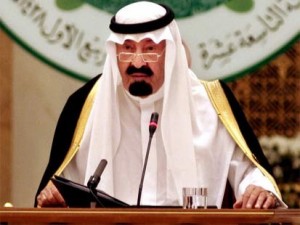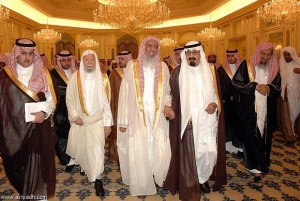Saudi King Abdullah has enough oil money to avoid the kind of social upheaval seen among the poor in Egypt and Tunisia, but the ageing monarch must reform if he is to keep a lid on dissent, analysts and diplomats say.
Although the top oil exporter has more than $400 billion in petrodollars stashed away to address social grievances, Saudi Arabia must address issues such jobs and housing, and the desire of an internet-savvy generation to have its voices heard.
While his countrymen were glued to their television screens watching the fall of Egypt’s Hosni Mubarak and Tunisia’s Zine al-Abidine Ben Ali, Abdullah has spent the last three months convalescing abroad, leaving reform plans stalled.
In a tightly controlled country with 19 million people and no tradition of political opposition, Saudis have slowly begun griping on Twitter about corruption. Last week Islamists launched an opposition political party, a taboo in the kingdom.
In the second-largest city Jeddah, anger built up after floods killed at least 10 people, triggering rare protests and dozens of newspaper editorials questioning why authorities were not better prepared and the state of infrastructure.
“I think people expect (the leadership) now to deal seriously with their problems,” said political analyst Khaled al-Dakhil, citing unemployment, housing, dependency on foreign labour and corruption as issues that need to be addressed.
ABSENT KING, ELECTIONS ON HOLD
Since taking power in 2005, Abdullah has done almost nothing to alter a political system of absolute monarchy, and little to change a social code that imposes some of the world’s most severe restrictions on personal behaviour.
Even narrowly-focused reforms, such as opening technical universities and launching training programmes for teachers and judges, have met with doubt from some parts of a powerful conservative clerical establishment.
The health-related absences of the king, who is around 87, and his brother and designated successor Crown Prince Sultan — out of the country for most of the past two years for unspecified treatment — have left reforms in limbo.
“Progress on policymaking of all kinds seems to be very slow at the moment,” said the Economist Intelligence Unit’s Jane Kinninmont. “In a system where decision-making is usually very top-down, the absence of these leaders really slows down policy activity.”
Saudi Arabia held municipal elections in 2005 before Abdullah took office, then seen as a step on the road to overhauling its political structure. But a fresh round of elections in which women hoped to participate was shelved in 2009 due to conservative opposition, according to diplomats.
Elections for a parliament have yet to be announced.
Riyadh has been trying to reassure allies the government is working normally while Abdullah is recuperating in Morocco after undergoing surgery over a slipped spinal disk in New York.
“Several government projects have been held up. Reforms which require the authority of the king seem to be put on hold,” said a Saudi-based analyst who declined to be named. “I think Abdullah should come back as soon as possible.”
Analysts had expected Abdullah to reshuffle his cabinet to inject fresh blood, but the cabinet’s term expired more than a week ago and no new cabinet was announced, suggesting ministers — some in office for 30 years or longer — will stay for now.
Many Saudis are waiting for King Abdullah to approve a much-delayed mortgage bill to provide affordable housing. The bill requires the king’s authority as the housing shortage touches the sensitive issue that most land is owned by royals.
“A mortgage law is one area that would give hope to one million households who need assistance to get their own homes,” said Daniel Broby, Chief Investment Officer at British fund manager Silk Invest which is invested in the Saudi bourse.
Education is one of the areas where some reform has begun, but the system still struggles to produce the scientists, engineers, economists and lawyers the country needs.
Overshadowing any long-term reform plans is the unanswered question of succession in a country that has been ruled for nearly 60 years by a single generation of kings, all sons of the founder of the state, King Abdul-Aziz.
When Abdullah went abroad, Sultan who is only slightly younger returned to run the country in his absence. If both are incapacitated, another brother, Interior Minister Prince Nayef, is expected to take the throne. Nayef is viewed as a conservative and suspicious of reforms.
Eventually the throne must pass to a younger generation. The king has set up a family council to regulate succession but has not made clear how and when it will begin work. Meanwhile, younger Saudis are growing impatient for change.
“Nobody will call for (regime) change but there will be people calling for political reforms,” said prominent Saudi journalist Jamal Khashoggi.
“People have demands, people have frustrations.”




















